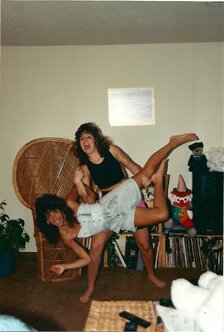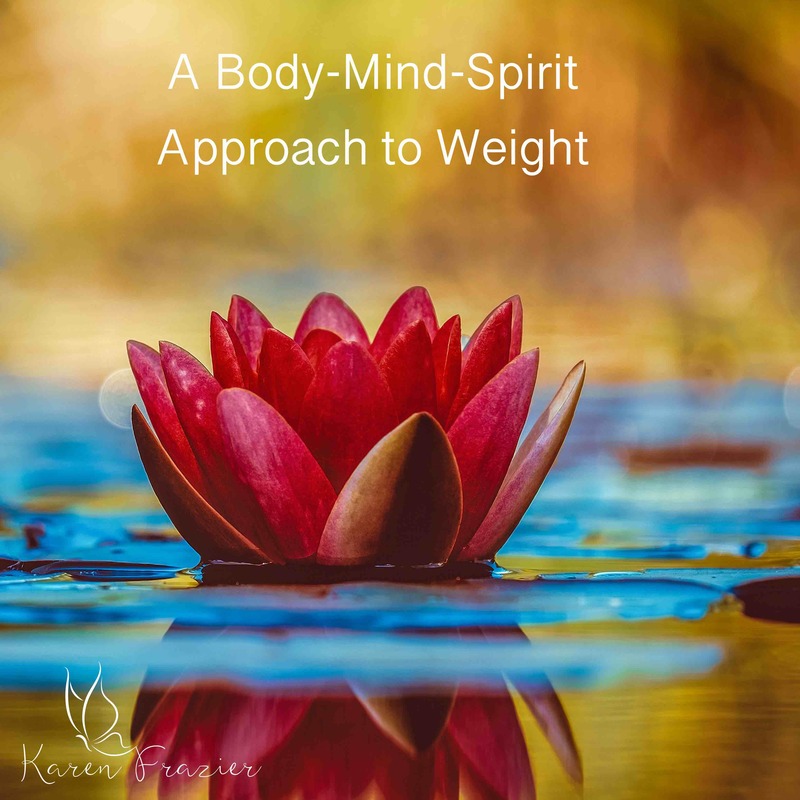|
I am frequently asked about weight and weight loss after my classes, online, and when I appear at events. Today, I realized it's not something I've discussed in my energy healing books, which is strange when you think about it because according to NIH, 2/3 of the adults in America are either overweight or obese. It may even be doubly strange I haven't talked about weight in the context of energy healing because I often write about body image and health nutrition in my other work, particularly my cooking blog and cookbooks. At one point, I would have described my own journey as a "struggle" with weight and told you that while it wasn't something that I necessarily felt defined me, it has certainly been a lifelong issue with which I continue to contend. I have gained and lost what I can only imagine are hundreds of pounds over the course of my life, and often my self-image of the moment was tied in to how much I weighed or what size I wore; or, as I thought of it, where I was on the yo-yo. I even had a body positivity essay I'd written called "How Being Fat Set Me Free" published in a Chicken Soup for the Soul book. However, as new research has come to the fore and I've worked to heal my own spiritual, physical, and emotional, and energetic issues, how I think about and understand weight gain, overweight and obesity, nutrition, body image, and health have shifted completely. And so I want to address weight in a very honest and compassionate way based on not only my understanding of nutrition and health, but also from the perspective of energy healing. Buckle up - this is going to be a lot of information. I want to start by saying this: If you feel weight and body image has been a defining struggle in your life, you are not alone. It is something many people ask me about after my energy healing classes or in the messages they send me. They usually ask privately and quietly, looking around to make sure nobody else can hear them. As an empath, I often sense a deep feeling of shame from them as they ask. Trust me. I get it. It took me years to come to terms with my weight and even now, when I look at pictures, I sometimes cringe because I am heavier than I would like to be. Weight is a painful issue for many. Being overweight is one of the last acceptable prejudices in our society. I spent years seeking medical diagnosis of a condition I knew I had from physicians who were unwilling to listen to anything I had to say from the moment I walked into their office as a fat woman. It took me more than two decades to even have a doctor be willing to order the simple blood test I needed to diagnose my Hashimoto's thyroiditis in spite of the fact I knew what it was due to my family history almost immediately when I started experiencing symptoms (and I fiercely advocated for myself). No matter what my health issue was for which I sought care and treatment for nearly 25 years, the diagnosis was fat. I had a cold because I was fat. I had kidney stones because I was fat. I sprained my ankle because I was fat. A bug flew into my eye because I was so fat, how could it miss me? Try as I might to advocate for myself, because of this dismissal from virtually everyone I encountered in the medical field, I felt deeply ashamed.  I'm the one standing up. I thought I was soooo fat. I'm the one standing up. I thought I was soooo fat. I've spent years studying health, nutrition, energy healing, weight, autoimmune disease, and many other subjects. I believe nutrition, movement, health, and physical habits are just as important a part of honoring our soul's path as spiritual practices and energy healing. There is a deep, unbreakable connection between body, mind, and spirit and when we experience imbalance in one, then there are imbalances in the other two as well. The result is dis-ease: a lack of ease in the body, mind, and spirit. This is important to understand for all conditions, and particularly for issues associated with weight. When you consider this interconnectedness of body-mind-spirit from a weight perspective, it becomes even clearer. The best way I can explain it is from the perspective of my story, which I'm sure is similar in many ways to some of yours. My Story I've always been a curvy girl. Even when my body fat was extremely low when I taught aerobics and competed as a bodybuilder, I still had boobs and a butt. It's just my body shape (I'm an hourglass), but in the 80s as I grew into my adulthood, curvy girls weren't fashionable. The body type back then was aerobically fit, flat, and extremely slim. Because of my body type, I often felt fat, and people often commented that I was "overweight" (I wore a 1980s size 7 which is probably about a 3 to 5 now). Media images perpetuated the message that my perfectly healthy body was somehow gross and aberrant. Because of this ambiguity about my weight, I developed the belief I didn't deserve to eat. When I ate anything, I felt powerful shame for my weakness. And then I spent hours exercising just to counteract an apple. Perhaps not surprisingly, by the time I was in college I had an eating disorder. I mostly didn't eat. When I did I threw up and exercised fanatically. I came home from my freshman year in college the thinnest I'd ever been as a 1980s size 0 to 3, and for the first time ever, people started complimenting me on how my body looked. And so, I developed a belief about my body and food. Eating - any type of eating - was bad and shameful. I was not entitled to eat. Think about that. I developed the belief I was not entitled to provide my body with nourishment. When I ate with people and they expressed envy at how little I ate, I felt virtuous. If I did eat something on the "bad" list and someone made a comment such as, "I don't know how you can stay skinny and eat a cookie," I was embarrassed and ashamed. I had created and embodied a pattern of thoughts that continued to plague me for decades. I also believed that about three hours of punishing exercise a day was good. If I only did two, I was ashamed of myself. If I sat and rested, I felt ashamed. I came to believe I was no longer entitled to nurture my body and give it rest, even when it cried out for it or when it was injured. At one point, I broke my foot (I dropped a 50 pound dumbbell on it) and continued to work out on my foot because to not work out didn't seem like an option. After college, I was certified by ACE as a personal trainer and an aerobics instructor. I worked in a gym and taught 12 90-minute aerobics classes per week. I was a competitive bodybuilder and coached a bodybuilding team, so I also spent at least 3 hours and usually more per day lifting weights. At the same time, I ate about 900 calories a day (I know because I tracked it religiously) so I could lose body fat and be competition ready. I was exhausted all of the time and terribly unhealthy, but people regularly complimented me about how I looked, how fit I was, and how thin I was. I wore a size 0. I clearly remember the day it all changed. I was at the gym doing my normal thing when I suddenly felt something shift inside of me. As if someone had flipped a light switch, all of the energy drained from me, and I started to shake and cry. It was as if one minute I felt normal and the next minute, I felt totally unlike myself. And then the weight started to come on. After the first 40 pounds, I went to see my doctor, terribly ashamed of what was happening. I remember telling him what my symptoms were: exhaustion, anxiety, hair loss, always being cold, brain fog, rapid weight gain in spite of the fact I was only eating about 900 calories a day and continuing to exercise as much as I could. This is what my doctor told me: "You're not a bad person because you're getting fat. Remember that. But you are eating too much and not moving enough. I think you must be underestimating how much you eat and overestimating how much you exercise." He didn't order tests. He didn't do a physical examination. He sent me home with a pamphlet on diet and offered me a prescription for diet pills, which I had the presence of mind to refuse. So essentially he told me a) I was getting fat; b) it was my fault; and c) I was either deluded or a liar about my food intake and exercise. And although I measured every portion, tracked every calorie, and counted every minute of exercise, I believed him because he was an authority and I was not. This was the pattern for the next two decades until my weight soared to over 300 pounds, I was exhausted all the time, I had exercise intolerance, and I constantly felt ill. During that time, doctors continued to berate me for my weight, tell me all I needed to do was eat less and move more and be more honest about how much I ate and moved, and not a single one ever suggested that what was happening to me might be a symptom of something else. In most cases, I had begged those doctors to test my T3 and T4 thyroid hormones because I knew what was happening to me, but they would only test my TSH, tell me it was within normal limits, and send me on my way feeling discouraged and ashamed. As the years went on, I developed a deep distrust of the conventional medical system in our country. I stopped visiting doctors unless it was an emergency, because I knew what they would say and how they would treat me. Most could barely hide the disgust in their eyes and their impatience. I started to work with energy healing and alternative medicine concepts and studied nutrition in depth to find out what it was my body needed. I was beginning to get a picture of health and nutrition that was quite different than any of my doctors had ever shared with me, and I knew I needed to make vital changes in my emotional, spiritual, and physical self. Then one day I ran into a friend who had shared many similar struggles. She had a sparkle in her eyes and looked healthy and happy. She'd also lost significant weight. It turned out, she had been treated by a local nurse practitioner who didn't approach health care in quite the same way. With a glimmer of hope, I made an appointment. It was life-changing. At my first appointment, the nurse practitioner ordered what I'd been asking doctors to order for years - a T3 and T4 thyroid blood test. Perhaps unsurprisingly, it came back abnormal, and I was finally able to receive the Hashimoto's thyroiditis and celiac disease diagnosis. She told me that my health picture was complex from years of misdiagnosis and misinformation, but that we could unravel the knot. I cried on the way home from my appointment, relieved someone had finally talked to me and heard what I was saying rather than talked at me and berated me. With my prescription of natural desiccated thyroid medication and the elimination of gluten from my diet, I noticed a substantial improvement in many of my symptoms, and I actually started to lose weight. With that puzzle piece in place combined with what I'd learned about nutrition, movement, and energy healing, I began to make real strides in improving my health and finding a place of balance once again. It took a long time, and I had to make significant changes in my beliefs about myself as well as in how I nourished my body. What You Can Learn from My Story My health picture was extremely complex, and it was deeply rooted in trauma I'd experienced in my life, my belief systems about myself and food, the ways I chose to move and nourish my body, and much more. The shame I felt and my belief my body had completely betrayed me also contributed to my growing ill health and dis-ease. In my case (as in almost everyone else's case), the physical affected the emotional, which affected the spiritual, and it all looped around itself with each of these factors affecting the other to create a state of chaotic imbalance in my being. Therefore, regardless of what I did for diet or how I tried to balance myself spiritually, until I'd worked through the emotional beliefs I'd absorbed and created about food, my body, and health, I was unable to unravel the gordian knot. As I started to unravel it, I realized my weight issue was related not only to messages I'd internalized about ideal bodies, but also to trauma sustained as a child and in young adulthood, food choices that didn't work with my body's unique needs, lack of care when my body cried out for food and rest, shame about the biological necessity of nourishing my body with food, negative messages from the medical establishment and media, and much more. My body was the outward expression of all of the pain I was holding onto. The fat created a layer of protection that I felt kept me safe from sustaining further trauma. It was only with a combination of loving care for my body, medical intervention to diagnose celiac and Hashimoto's diseases, healing nutrition, sustainable and pleasurable movement, forgiveness of self and others, deep spiritual and emotional work on body image, energy healing work, and additional spiritual work that I was finally able to gain some level of control. And for most people with overweight and obesity or body image issues, their situation may not be exactly the same as mine, but it is likely just as complex. Managing the Physical Aspects of Obesity: It Is Not a Disease - It Is a Symptom Here's something many of you have probably never heard from your health care providers, but it is nonetheless true. Overweight and obesity is not who or what you are. It does not define you, nor does it say anything about you other than this: It is a symptom of underlying medical issues. Obesity and overweight is not the disease. It is the symptom. Even if you're drowning your sorrows in a gallon of ice cream and two large extra cheese meat lovers pizzas every night before you go to bed, it is a symptom. I'll say it again because this is so important. Overweight and obesity is NOT a disease of its own. It is a symptom that is the manifestation of processes that have gone wrong in your body (often hormonal), and obesity researchers are starting to recognize this. Some possible causes of the symptom of overweight and obesity include:
So what can you do? There are several physical steps you can take:
Image by Devon Breen from Pixabay Eat in a Way that Nurtures Your Body Every body is different, so we all need to find ways to eat that work for us. However, one of the most important physical and emotional things you can do is eat to nurture your health. This involves a process of figuring out which foods work for your body and which don't. To discover this, I recommend a 15 to 30 day elimination diet (I've outlined an elimination diet in this blog post) followed by several weeks of testing various foods to see what your body tolerates well. Some general suggestions to eat to nurture your body:
Respect Your Body's Needs Our bodies are constantly talking to us. We've just learned not to listen to them. Think about it: when we have a symptom, one of the first things we do is take a medicine to suppress it (aspirin for a headache, for example). But these symptoms are your body's signals, telling you there is an imbalance that needs correcting. When you mask the symptom or ignore it, you are discounting your body's message, which is telling you there is an underlying cause and something is wrong. When you are tired, your body is telling you it needs sleep. When you are in pain or have a symptom, your body is pointing out an imbalance that could lead to dis-ease. It's up to you to start to respect and listen to what your body has to tell you, and then to thank it for sending you clear signals.
Image by Jackson David from Pixabay Managing the Emotional and Spiritual Aspects of Weight
Ah the emotional aspects of weight. When you truly stop to think about what body fat is and what its purpose is, it seems almost silly body fat, the number on a scale, or the size of our ass are so emotionally fraught for so many of us. And yet, it is. We have huge emotions tied up in weight. We allow it to control us and to direct our self-image. Sometimes, we allow our fat to keep us from living our best lives. We allow our body size to define us. We believe that if there is more of us than there are of others, we are somehow, on some level, less than. And so, when we look at ourselves in the mirror or in a photograph, we cringe inwardly and send the message to our bodies, "I hate you." With those simple three words, we do so much damage to ourselves. We hurt ourselves emotionally. We harm ourselves physically. And our spirit recedes just a little because we are disowning this spectacular biological marvel we carefully chose and gifted to ourselves when we were spirits deciding who and what we'd be in the adventure of our new embodied lives. When we look at our bodies and hate them, we are rejecting the gift we gave ourselves out of love before we arrived as babies in our mothers' wombs. Thought, words, and belief are powerful. Look no further than Masaru Emoto's research he laid out in The Hidden Messages in Water in which he showed just how powerfully thoughts affect how matter manifests. Look at the powerful picture of broken, muddy water crystals from thoughts like I hate you, versus lovely, ordered crystals from thoughts such as I love you. Your body is 60 percent water. Imagine how your thoughts, such as "You're ugly" or "I hate you," or "You're disgusting," affect your body, which has done nothing but love and support you from the moment you were born. If thoughts, words, and beliefs harm water, what does that energy do to you? Don't believe your body has supported you since the moment you were born? It's a marvel. Every day your respiratory system takes more than 23,000 breaths without your intervention. Every day your feet and legs support you as you stand. Your heart pumps more than 115,000 times each day, sending the life force that is blood throughout your body. It has carried you all your life - millions of steps to get you where you need to go. Our bodies do this for us without being asked. Our bodies have always been there for us, but it's so easy to hate them rather than holding them in the awe, gratitude, and love they deserve. There are many reasons we disconnect from our bodies. I know I did. For many years - most of my adult life actually, I felt as if I existed somewhere outside of my body - as if I hovered above it rather than inhabiting it. I had decided if I had no control of what was happening to me physically, I'd just become a mind and a spirit instead, and focus on those aspects of self. But without balance between the three, body-mind-spirit, there is no health and there is no wholeness. Even if we are gravely ill, we cannot disown our bodies. In fact, illness, pain, and bodily issues exist to force us to inhabit them so we can find balance and seek healing. For many, disconnection from the body feels necessary to survive. For people who have endured physical or sexual abuse or trauma, it feels safer to pretend our bodies don't exist or aren't part of us. And often in the case of overweight and obesity, we pad ourselves with additional girth with the false belief we need extra size to keep us physically and/or emotionally safe. This creates only a false sense of security, however. Doing so distracts us from the true issue, and it keeps us from finding balance and true healing. In other cases, our bodies are larger than normal to hold our generous, gigantic, overflowing spirits and big dreams. They have grown to suit us. They have grown to fit and support us. And yet, in spite of the gift our bodies have given us in this way, we say, "I hate you. Why can't you be thinner/more attractive/curvier..." Our bodies need us as much as we need them. It is a partnership of three, and in order to live a rich, full embodied human life, we must respect this triumvirate. We cannot heal until we can look at our body in whatever form it takes with however much fat as it has on it and say with a depth of truth and gratitude, "I love you." So how do we heal when we have internalized so many messages about our bodies for years, when we feel our bodies are a source of pain or shame, or when we truly feel betrayed by them because of what has happened to us? How do we learn that in order to be a fully realized and whole human being, we can't be a mind and spirit floating outside of a body? How do we get to a place where we can look at ourselves and truly say, "I love you body. Thank you body"? We do the work. We delve deeply into our shadows to find the parts of ourselves that we hold in shame or pain, and we shine the light of love on them. We recognize the fallacy in the beliefs we hold about our physical selves. We speak words of affirmation, love, and acceptance towards our bodies, even when we don't believe them. We fake it 'til we make it. We wear clothes and jewelry that make us feel good. We stop worrying about what others think, throw convention aside, and clothe and decorate our bodies in ways that make us smile and laugh. We start using our bodies in ways that feel pleasurable and joyful to us. And we constantly monitor our thoughts for those fleeting messages that flit through our minds that tell us our bodies are somehow wrong, shameful, or not enough. And then, we practice gratitude with our bodies. We notice all they do for us and we take the time as often as we can to gently place our hands over our hearts, close our eyes, and say quietly and with feeling, "Thank you body." In short:
You Have This Body for a Limited Time Only Finally, remember this as you work on healing. You will you occupy this wonderful, beautiful, bold body for only a short time before you leave it, return to the Source, and then choose a new one for a new life. You chose this body when you were in spirit. You wanted it for a reason. It is where you reside, and for the immediate future where you go, it goes. It is here for you, and regardless of its condition, it is a pretty amazing partner that supports you even without you asking. Your body deserves your love. You deserve your love. It doesn't matter what size your body is or how it looks. It only matters how you inhabit it, how you treat it, and how much you love it for the time it is with you. So you might as well settle in and find as much joy in this lifetime as you can for as long as you have this body. It's been with you since birth, and it will always give you exactly what you need to serve your greatest good in this lifetime. Thank you body. I love you body. Image by Couleur from Pixabay
0 Comments
Leave a Reply. |
Categories
All
Archives
December 2022
|
AUTHOR KAREN FRAZIER
- Home
-
Books
- Angel Numbers for Beginners
- Avalanche of Spirits
- Chakra Crystals
- Complete Reiki
- Crystal Alchemist
- Crystals for Beginners
- Crystals for Healing
- Dancing with the Afterlife
- Dream Interpretation Handbook
- Essential Crystal Meditation
- Higher Vibes Toolbox
- Introduction to Crystal Grids
- Little Book of Energy Healing Techniques
- Noisy Ghosts
- Reiki Healing for Beginners
- Transform Your Life with Alchemy
- Ultimate Guide to Psychic Ability
- Usui Ryoho Reiki Manual
- Cookbooks
- Other Books
- Classes
- Connect
- Meditate



 RSS Feed
RSS Feed
